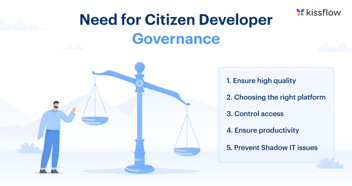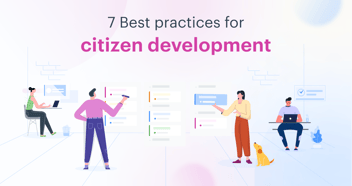Citizen development is gaining significant attention in organizations. It enables the non-IT workforce to develop applications without coding skills and drives innovation and efficiency within the organization. However, like any transformation initiative, citizen development has its own set of challenges. In this blog, we will discuss how organizations can identify and overcome these challenges to harness the full potential of citizen development.
Why are citizen developers necessary to drive innovation in today's businesses?
Citizen developers play a crucial role in boosting innovation and agility in modern businesses because they bring domain expertise and firsthand knowledge of business needs. Their involvement accelerates the development process, enabling rapid iteration and adaptation to changing requirements. Businesses can respond quickly to market demands, experiment with new ideas, and stay ahead of the competition.
The challenges of citizen development
Although citizen development presents many benefits, failing to address its accompanying challenges may worsen issues rather than resolve them. Some of the common challenges are:
| Misconception |
Clarification |
| Citizen development leads to shadow IT. |
When properly governed, citizen development initiatives operate within established guidelines and do not contribute to shadow IT |
| Citizen development platforms lack security and compliance controls. |
With proper governance and supervision, citizen development platforms can enforce security and compliance measures comparable to traditional IT with proper governance and supervision |
| Citizen development does not align with organizational goals. |
When aligned with strategic objectives citizen development can enhance agility, innovation, and digital transformation within organizations |
The need for internal governance
Citizen developers might create applications without appropriate boundaries that don’t integrate well with your existing infrastructure. There's also the risk of producing irrelevant applications or making unnecessary changes to current applications. Without governance control, such programs are likely to fail, resulting in losses in productivity and revenue.
Learn more: Why Do You Need Governance In Citizen Development?\
“Citizen developers employing low-code and no-code have the potential to be the talent shortage's saving grace. Alongside the booming of low-code and no-code platforms and citizen developers, IT departments have been freed up from a resource perspective, allowing them to evolve beyond cost centers and into more proactive implementers of technology, overseeing policy, compliance, and identifying new business opportunities and streams of revenue," says Stanley Huang, Co-founder and CTO at Moxo.
Skill gaps
While low-code/no-code platforms for citizen developers are designed to be user-friendly, non-technical users can still experience a learning curve. Bridging the skill gap to enable effective application development is crucial. Investing in training programs that focus on the basics of application development and the specific functionalities of the chosen platform can help. Regular workshops and support from IT professionals can further empower citizen developers to gain confidence and proficiency in using these tools.
Integration issues
Ensuring that new applications developed by citizen developers integrate seamlessly with existing enterprise systems can be complex. Choosing platforms that offer pre-built connectors and APIs for easy integration with other enterprise systems is essential. Such an approach ensures a smooth data flow across the organization, maintaining consistency and efficiency.
IT oversight
Applications developed by citizen developers may sometimes lack the robustness and performance optimization typical of professionally developed software. It is crucial to establish a review and testing process where IT professionals can provide feedback and ensure that applications meet performance and quality standards before they go live. This collaborative approach helps maintain desired quality levels while leveraging citizen development's agility.
What can your organization do to elevate citizen development in your organization?
Establishing a Center of Excellence (CoE) can significantly enhance your organization's citizen development initiatives. Here are some steps to ensure success:
Plan thoroughly
Begin with a clear plan that outlines your citizen development program's goals, scope, and structure. Define citizen developers' and IT professionals' roles and responsibilities and establish application development and data management guidelines.
Train citizen developers
Invest in comprehensive training programs to equip citizen developers with the skills to use low-code platforms effectively. Regular workshops, online courses, and hands-on training sessions can help bridge the skill gap and ensure citizen developers are confident in their abilities.
Establish approval mechanisms
Implement structured approval processes to maintain control and governance over citizen-developed applications, ensuring all applications meet organizational standards and comply with security and regulatory requirements.
Promote collaboration
Encourage collaboration between IT and citizen developers through regular meetings, joint projects, and shared communication platforms. IT oversight is crucial for maintaining quality, security, and compliance in citizen development initiatives.
Monitor and optimize
Use monitoring tools to track citizen-developed applications' performance, security, and compliance. Regular audits and assessments can help identify areas for improvement and ensure that the CoE continues to deliver value to the organization.
Overcoming the challenges of citizen development can significantly enhance innovation, agility, and efficiency within your organization. By addressing governance, security, integration, and skill gaps and ensuring IT oversight, you can unlock substantial benefits such as speed and agility, enhanced innovation, better alignment of app design with user needs, increased efficiency, optimized costs, reduced burden on IT teams, and increased transparency.
Conclusion
Citizen development is revolutionizing how organizations innovate and operate, but it comes with its own challenges. Addressing these challenges head-on is essential to fully harness its potential. Platforms like Kissflow can support your digital transformation journey by providing the tools and resources needed to empower citizen developers while ensuring necessary supervision and control. Embracing citizen development with the right strategies and tools can drive your organization toward greater success and competitiveness.








